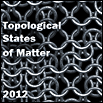Speaker
Xiaoliang Qi
(Stanford University)
Description
In this talk, I will discuss a general class of non-abelian
statistics which can be created in topological states by
introducing extrinsic defects, such as lattice dislocations or
superconductor-ferromagnet domain walls in conventional
quantum Hall states or topological insulators. In particular,
these defects can be realized in certain lattice fractional
Chern insulators named as topological nematic states.
In this paper, we begin by placing these defects within the
broader conceptual scheme of extrinsic twist defects
associated with symmetries of the topological state. We
explicitly study several classes of examples, including Z2
and Z3 twist defects, where the topological state with N
twist
defects can be mapped to a topological state without twist
defects on a genus g / N surface. To emphasize this
connection we refer to the twist defects as genons. We
develop methods to compute the projective non-abelian
braiding statistics of the genons, and we find the braiding is
given by adiabatic modular transformations, or Dehn twists,
of the topological state on the effective genus g surface. As
an particularly interesting example, we find situations
where the genons have quantum dimension 2 and can be
used for universal topological quantum computing (TQC),
while the host topological state is by itself non-universal for
TQC.

